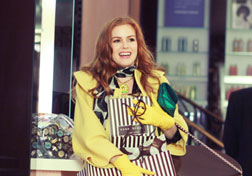Confessions of a Shopaholic
A comedy that recalls the happy time when America wasn't a financial ruin.
To listen to Slate's Spoiler Special about Confessions of a Shopaholic, click the arrow button on the player: You can also click here to download the MP3 file, or you can subscribe to the Spoiler Special podcast feed in iTunes by clicking here.
Confessions of a Shopaholic (Disney Pictures), a petite morality tale about consumer debt, was shot in the last few months before a wave of tanking markets and failing banks laid waste to the U.S. economy. The received wisdom in Hollywood is that this turn of fortune constituted rotten luck for the movie and its star, Isla Fisher. ("When Will Isla Fisher Catch a Break?"moaned Defamer.) But if Confessions of a Shopaholic weren't an anachronism, it wouldn't have what little power it does. Last summer, this movie would have passed unnoticed as an undistinguished knockoff of brand-name comedies like Sex and the City or The Devil Wears Prada. But in early 2009, as the bill for America's own two-decade shopping binge comes due, Confessions of a Shopaholic has the musty fascination of something exhumed from a time capsule.
Fisher playsRebecca Bloomwood, a journalist who loses her job when her magazine unexpectedly folds (one of the movie's few indicators that the publishing world is anything less than robust). On her way to an interview at the fashion magazine Alette, Rebecca is waylaid by an overwhelming desire to possess a diaphanous green scarf she sees in a shop window. (A recurring special effect in which molded plastic mannequins come to life to tempt her with their wares is, admittedly, nifty.) The attempt to purchase said scarf reveals two things: that Rebecca's credit cards are maxed out—she's in debt, we soon learn, to the tune of $16K—and that she's a compulsive shopper who can't stop making ridiculously poor life choices. Little matter, though, because the world has a way of forgiving Rebecca. After missing her Alette interview, she blunders her way into a job at a financial magazine, Successful Savings, despite a transparently faked résumé and a salient lack of expertise about, well, anything. This may be because of the power Rebecca's charm exercises on Successful Savings' editor-in-chief, Luke Brandon (Hugh Dancy). (Quick: Which is the fruitier leading-man name, Luke Brandon or Hugh Dancy?) Rebecca is promptly given a column of her own, in which she analyzes the world of finance through the lens of high fashion (or something). But as the column becomes a hit, Rebecca struggles to cover up her own shopping addiction, piling lies on top of excuses as a persistent creditor (Robert Stanton) stalks her—first by phone, then, eventually, through the streets of Manhattan.
Lucky for the movie that Isla Fisher is so likable, because Rebecca Bloomwood is a real dud of a human being: a vain, shallow, materialistic twit who abuses the trust of both her endlessly forgiving boss and her enabling roommate, Suze (Krysten Ritter). The character's moral trajectory over the course of the film makes no sense: She's rewarded over and over for poor performance, and when her comeuppance does arrive, it's so brief and easily overcome that the message seems to be: When in dire financial and personal distress, charge one last cute outfit on your credit card and lie like crazy. No one ever tells Rebecca what she most needs to hear: that her obsession with designer labels to the exclusion of all else is not only an unwise spending strategy but a repellent personality trait. Perhaps to drive home that point (or am I giving the movie too much credit?), the costumes, designed by Sex and the City'sPatricia Field, are garishly clashing fuchsia-and-orange ensembles a-drip with befuddling accessories. (One of Rebecca's more confusing adornments appears to be a large square of folded felt pinned to her lapel.) Sarah Jessica Parker's Carrie wore some fugly get-ups on Sex and the City, but at least they looked expensive. The wardrobe that nearly puts Rebecca in the poorhouse could easily have been ordered online from Forever 21.
Fisher's wide-eyed charm and faintly Lucille Ball-esque gift for slapstick elevate the movie, barely, into watchable territory. Future roles should take more advantage of Fisher's cheerful willingness to abandon her dignity; she's game for anything, including an amusingly klutzy dance sequence involving a Spanish fan. Dancy, as her inexplicably bedazzled editor, is a reasonable placeholder in the leading-man spot; given the right material, he could be Hugh Grant, if not quite Cary Grant. But a supporting cast of fine comic actors—Joan Cusack, John Goodman, Kristin Scott Thomas, John Lithgow—is so underused that they might as well be stacked in corners like cordwood.
If you spin out the unintended analogy of Confessions of a Shopaholic to the current financial crisis, the film starts to mutate from a not-that-funny comedy into a tragic allegory. If the carelessly spendthrift Rebecca is the equivalent of the insolvent Wall Street banks, then the characters who enable her habit—her indulgent boyfriend/boss, her infinitely patient roommate, her eager-to-help parents—must be the proponents of the watered-down bailout bill. In an attempt to save Rebecca from her own mistakes, they make too many concessions and wind up with no guarantee that she won't lie her way into hock once again. Meanwhile, the audience, standing in for the American taxpayer, wonders, "Why did I pony up good money for this?"
Slate V: The critics on Confessions of a Shopaholic and other movies

